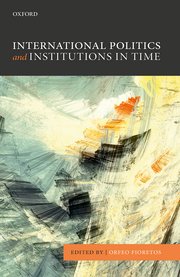
Orfeo Fioretos (editor), International History and Politics in Time. Oxford and New York: Oxford University Press, 2017.
URL
The modern international system has developed into an institutionally complex and layered arrangement. The states and international actors that manage pressing global challenges this century operate with institutions that were designed in earlier eras and often for different challenges. Many institutions have persisted over time and are credited with securing political goals in the face of major crises. Other institutions are said to foster gridlock and inefficiencies. At the same time states and international actors add and modify institutions, often in incremental fashion. This volume explains why the twenty-first century international system has taken on its layered characteristics with time and what consequences institutional complexity has for international politics.
International Politics and Institutions in Time explores the sources of institutional continuity and change in an increasingly complex system of international relations. It reveals the contributions that historical institutional analysis makes to the International Relations discipline by providing new answers to disciplinary puzzles, discovering novel empirical patterns, and revisiting conventional understandings of international politics across the ages. Pioneering essays by leading scholars address the origins, durability, and change in the rules and norms associated with state sovereignty, global governance, and international order, as well as the specifics of international security, financial, monetary, trade, health, human rights, environmental, and regulatory affairs.
Contributors: Karen J. Alter, Steven Bernstein, Henry Farrell, Martha Finnemore, Orfeo Fioretos, Judith Goldstein, Robert Gulotty, Tine Hanrieder, Eric Helleiner,G. John Ikenberry, Joseph Jupille, Robert O. Keohane, Stephen D. Krasner, Walter Mattli,Manuela Moschella, Abraham L. Newman, Kathryn Sikkink, Duncan Snidal, Etel Solingen, Hamish van der Ven, Wilfred Wan, Catherine Weaver, Michael Zürn.
URL
The modern international system has developed into an institutionally complex and layered arrangement. The states and international actors that manage pressing global challenges this century operate with institutions that were designed in earlier eras and often for different challenges. Many institutions have persisted over time and are credited with securing political goals in the face of major crises. Other institutions are said to foster gridlock and inefficiencies. At the same time states and international actors add and modify institutions, often in incremental fashion. This volume explains why the twenty-first century international system has taken on its layered characteristics with time and what consequences institutional complexity has for international politics.
International Politics and Institutions in Time explores the sources of institutional continuity and change in an increasingly complex system of international relations. It reveals the contributions that historical institutional analysis makes to the International Relations discipline by providing new answers to disciplinary puzzles, discovering novel empirical patterns, and revisiting conventional understandings of international politics across the ages. Pioneering essays by leading scholars address the origins, durability, and change in the rules and norms associated with state sovereignty, global governance, and international order, as well as the specifics of international security, financial, monetary, trade, health, human rights, environmental, and regulatory affairs.
Contributors: Karen J. Alter, Steven Bernstein, Henry Farrell, Martha Finnemore, Orfeo Fioretos, Judith Goldstein, Robert Gulotty, Tine Hanrieder, Eric Helleiner,G. John Ikenberry, Joseph Jupille, Robert O. Keohane, Stephen D. Krasner, Walter Mattli,Manuela Moschella, Abraham L. Newman, Kathryn Sikkink, Duncan Snidal, Etel Solingen, Hamish van der Ven, Wilfred Wan, Catherine Weaver, Michael Zürn.